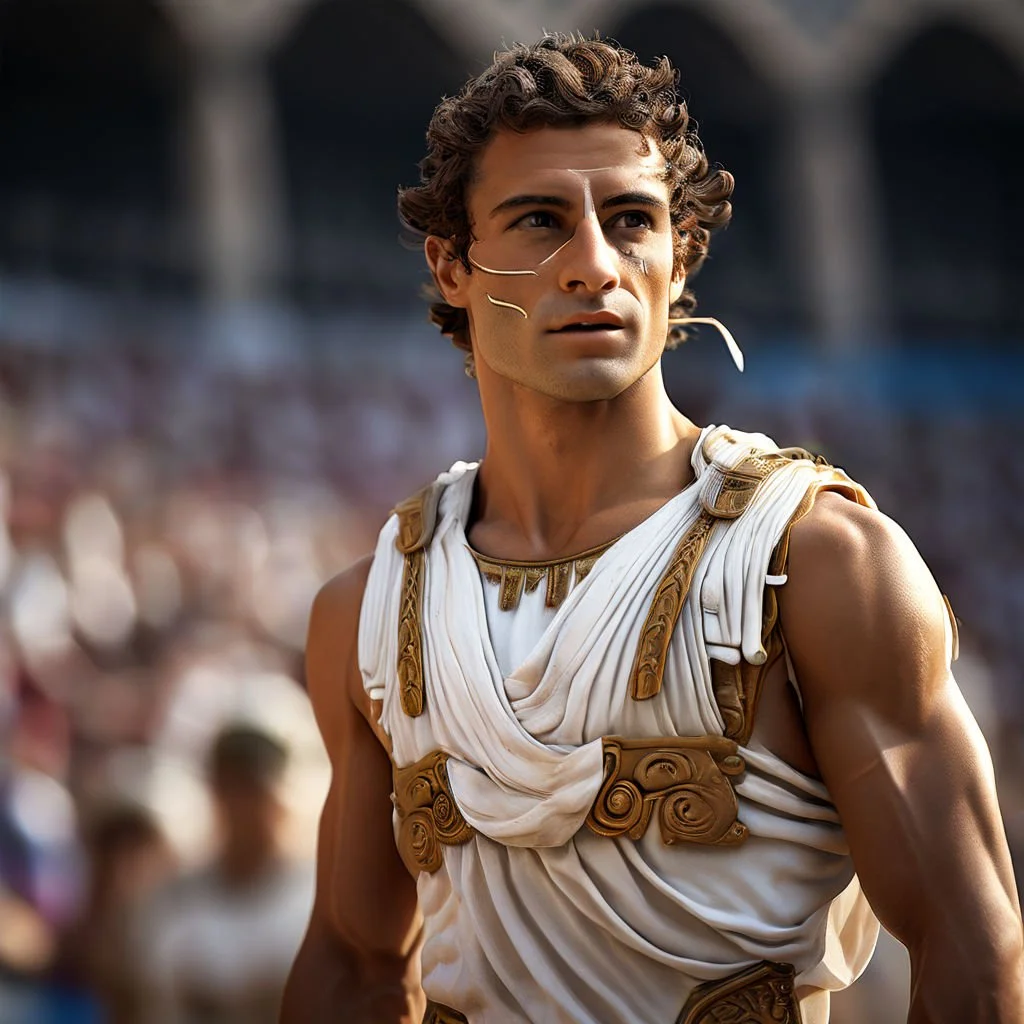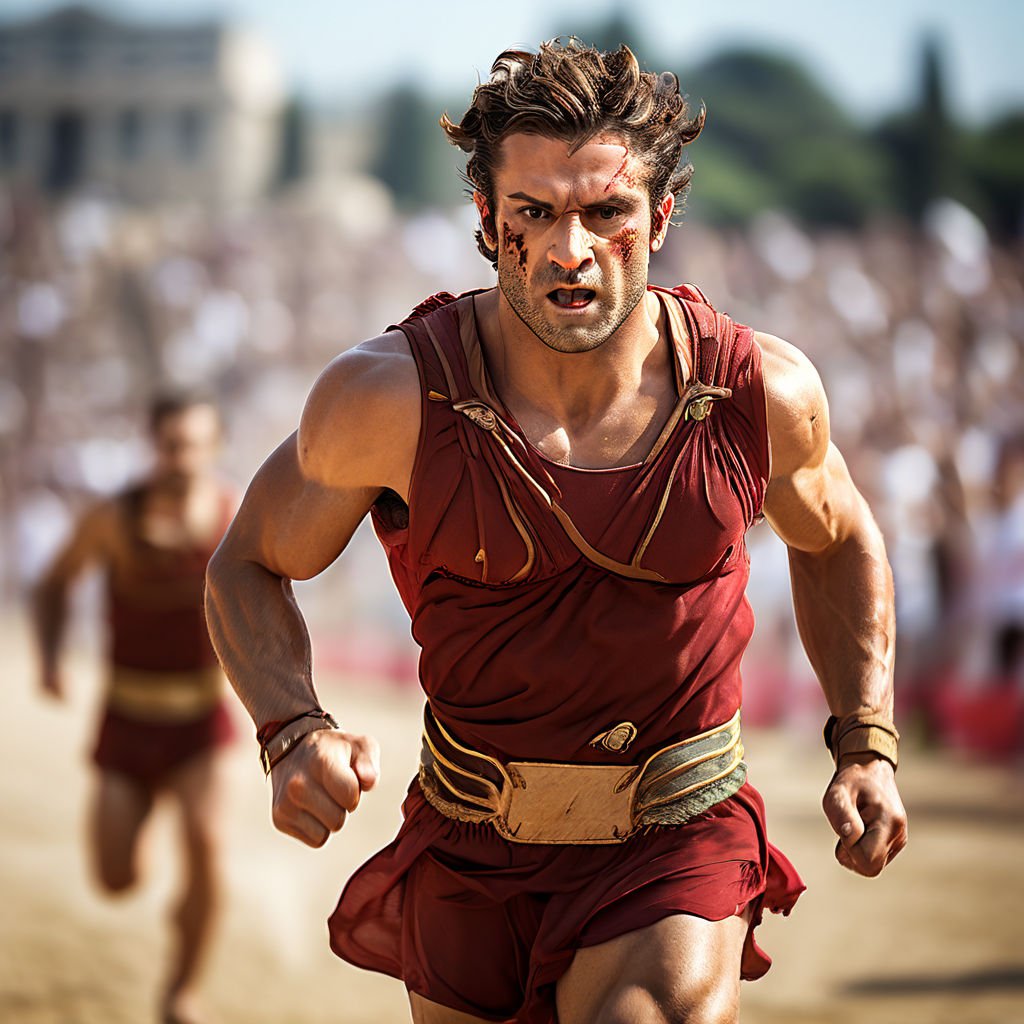The Spiritual Essence of Sport
Holosophy: The Spirituality of Sport:
In the modern world, where athletes are celebrated as contemporary heroes, there's a profound undercurrent that connects their physical prowess to a deeper, almost divine, essence. This spiritual dimension of sport, often overlooked in the rush of competition and glory, draws from ancient philosophies and timeless wisdom. To truly understand the significance of sport, we must delve into the heart of Greek philosophy and the concept of "Holosophy"—the spirituality of sport.
An athlete in tune with their inner core of peace and strength holds a unique advantage. They harness the energy of the universe, blending physical power with a spiritual playfulness that echoes the divine. This connection elevates their performance beyond mere physicality, touching on something ethereal. It’s as if they channel the energy of the cosmos, transforming their actions into a celebration of life itself.
The ancient Greeks understood this well. For them, sport was not merely a physical contest but a religious celebration dedicated to Zeus, the king of the gods. Athletes were seen as near-divine beings, embodying the perfect balance of body, mind, and spirit—what the Greeks called ARETE. This ideal, symbolized by an equilateral triangle, represented the foundation of a balanced human being, where physical, mental, and spiritual dimensions are in perfect harmony.
Sport, in its truest form, is as much a state of mind as it is a physical endeavor. It’s not just about having a "great spirit," but about being a "great spirit." This profound connection between body and soul was encapsulated by Joseph Campbell when he said, "When we as mortals experience heaven here on earth, then that is heaven."
This sentiment resonates deeply within the philosophy of Holosophy—a perspective that sees triumphs in sport as moments of ecstatic transformation. These victories, whether personal or collective, bring about a state of euphoria that can only be described as heavenly. Athletes, in these moments, are not just competitors; they are champions, transcending the ordinary to touch the extraordinary.
To be a champion is to touch, even if just for a moment, the realm of the gods. Athletic performance, much like the feats of the heroes and gods of ancient Greece, is a temporary achievement of perfect form. It's a glimpse into a world where human limitations are transcended, where the soul of sport becomes everlasting.
The Greek poet Homer captured this essence in his works, especially in "The Odyssey," where he challenges us: "Sport is the greatest way to fame for any man—what you can do with your arms and legs." The fame of an Olympic champion in ancient Greece did not end with their death. In many cases, they were worshipped as heroes, not merely because they were successful athletes, but because they had once embodied the divine on earth.
Human beings have been running for millions of years, first as hunters chasing game across the plains. This ancient drive to hunt and compete is still ingrained in us. The prehistoric hunters were among the best runners the planet has ever known. Each of us still carries a fragment of this ancient excellence within us.
Sport, at its core, is a spontaneous activity—a way to turn work, warfare, and life itself into a game. This primal impulse to play, to compete, is an expression of our deepest desires, a manifestation of our dreams. It’s through this reconciliation between inevitable conflict and the desire to play enthusiastically that we can truly say we are "filled with the gods."
To be playful in dramatic circumstances is a spirit that dates back to the epic tales of Homer, where heroes and warriors are depicted as athletes always striving to win, to be better than the rest. The spiritual dimension of play emerges when games evolve into matches, and when the gods themselves seem close in the drama of the contest. Something divine occurs—a reminder of the excellence or the so-called sacred existence. Sport’s mythological significance lies in its ability to transport us to another world, revealing ecstatic possibilities that we might not find elsewhere. This is the true essence of Holosophy.
The mythopoetic nature of sport proclaims that we can best grasp the world through admiration and wonder, a perspective only possible through a playful attitude towards life. Sport, in this sense, becomes our "home," with an inexplicable power to renew our spirit, to even recreate us. The game is worth the suffering because the ecstasy is worth the agony.
When we dive deep into this agony, we discover the true meaning of ecstasy—being "in the zone." The saying "no pain, no gain" comes alive in this profoundly astonishing experience. It’s as if sport is the only thing capable of invoking this rapturous, dramatic, mythological experience.
Holosophy is the spirituality of sport. It’s the realization that when we engage in physical activity, we’re not just moving our bodies; we’re aligning our spirits. As George Sheehan, a renowned running philosopher, once said, "When I run, my body and spirit become one." This union of body and spirit is the pinnacle of athletic achievement, a state where the boundaries between the physical and the spiritual blur, and we touch the divine.
In conclusion, the essence of sport goes beyond the physical competition. It’s a journey into the spiritual, a way to connect with something greater than ourselves. Whether we are running, jumping, or playing, we are, in those moments, touching the divine, becoming champions not just in the arena, but in life itself.
FEEL FREE TO VISIT MY WEBSITE BELOW THAT TRY TO CAPTURE THE ESSENCE OF SPIRITUALITY!
—
The Sacred Significance of the Olympic Games: A Bridge Between Mortals and Immortal Gods
The Olympic Games, one of the most revered traditions of ancient Greece, were far more than just a series of athletic competitions. They were a sacred institution, deeply intertwined with the religious and cultural fabric of Greek society. These games served as a bridge between the mortal world and the realm of the immortal gods, embodying the ancient Greeks' quest for excellence, honor, and divine favor. The Olympics were not merely a showcase of physical prowess; they were a spiritual pilgrimage, a way for mortals to connect with the divine and, in doing so, touch the eternal.
At the heart of the Olympic Games was a profound religious purpose. The games were originally established as a festival to honor Zeus, the king of the gods, who reigned supreme on Mount Olympus. Held every four years in the sacred sanctuary of Olympia, these games were a form of worship, a way for the Greeks to express their reverence for Zeus and seek his blessings.
The sanctuary of Olympia itself was a place of immense spiritual significance. It was believed to be a meeting point between the earth and the heavens, a place where the divine could interact with the mortal. Here, the finest athletes of Greece would gather, not just to compete but to pay homage to the gods through their physical excellence. The very act of competing in the Olympics was a form of prayer, an offering of one’s best self to the divine.
In the context of the Olympic Games, athletes were seen as more than just competitors; they were embodiments of divine will. The Greeks believed that the gods had a direct influence on the outcome of the games. Victory was not just a result of physical skill or training; it was a sign of divine favor. To win at the Olympics was to be chosen by the gods, to be recognized as an individual who had achieved a level of excellence that bordered on the divine.
This belief in the divine nature of athletic success is reflected in the way Olympic victors were celebrated. Winners were often hailed as heroes, their names immortalized in statues and poems. They were granted a status that transcended the mortal realm, sometimes even worshipped as demi-gods after their death. The Olympic champion, in this sense, became a living link between the human and the divine, a reminder of the gods’ presence in the world of men.
Central to the Olympic Games was the Greek ideal of ARETE, a concept that encompassed excellence, virtue, and the fulfillment of one’s potential. In the realm of athletics, ARETE represented the perfect harmony of body, mind, and spirit—the qualities that defined a true champion. The pursuit of ARETE was not just about winning; it was about striving to achieve one’s best, to push the boundaries of human potential, and in doing so, honor the gods.
This quest for excellence was seen as a sacred duty. The Greeks believed that by striving for ARETE, athletes were participating in a divine process, a continuous effort to transcend their mortal limitations and approach the perfection of the gods. The Olympic Games were thus a celebration of this journey, a testament to the belief that through discipline, dedication, and divine favor, humans could rise above the ordinary and touch the extraordinary.
The Olympic Games were steeped in ritual and ceremony, further emphasizing their sacred nature. Before the games began, athletes and spectators would participate in a series of religious rituals, including sacrifices to Zeus and other gods. The most significant of these was the sacrifice of a hundred oxen at the altar of Zeus, a powerful symbol of the games’ religious foundation.
These rituals were not mere formalities; they were essential aspects of the games, reinforcing the connection between the athletic contests and the divine. By participating in these ceremonies, athletes purified themselves, both physically and spiritually, preparing to compete in a state of grace that honored the gods.
Moreover, the games themselves were seen as a form of ritual, a re-enactment of the heroic struggles and divine contests that were central to Greek mythology. The physical challenges faced by the athletes mirrored the trials of the gods and heroes, making the games a living representation of the eternal struggle between human effort and divine will.
For the ancient Greeks, the Olympic Games offered a path to immortality. To achieve glory in the games was to ensure that one’s name would be remembered long after death. This desire for eternal remembrance was deeply connected to the Greek belief in the afterlife, where the souls of the dead continued to exist in the shadowy realm of Hades.
The Olympic champion, however, transcended this fate. Their victories were celebrated in songs and stories, their images immortalized in statues, and their deeds recorded in the annals of history. In this way, the Olympic victor achieved a form of immortality, living on in the memory of future generations as an embodiment of divine excellence.
This concept of immortality through athletic achievement is perhaps best exemplified in the tradition of the victor’s crown—a simple olive wreath cut from the sacred grove of Zeus. This crown symbolized not just victory, but the athlete’s connection to the divine and their place in the eternal order. By wearing this crown, the Olympic champion was not just honored by their fellow mortals; they were acknowledged by the gods as one of their own.
The legacy of the ancient Olympic Games is one of enduring significance. While the games themselves were deeply rooted in the religious and cultural practices of ancient Greece, their influence extended far beyond the boundaries of Olympia. They embodied the Greek ideals of honor, excellence, and the pursuit of greatness, ideals that continue to resonate in the modern world.
In the end, the Olympic Games were more than just a series of athletic contests; they were a profound expression of the Greek belief in the potential of the human spirit to reach towards the divine. Through their participation in the games, athletes not only sought to achieve personal glory but to honor the gods and reaffirm the connection between the mortal and immortal realms.
Today, as we celebrate the Olympics in a vastly different context, the echoes of these ancient ideals still linger. The pursuit of excellence, the celebration of human potential, and the quest for immortality through athletic achievement—all these elements continue to define the spirit of the Olympic Games. In this way, the legacy of the ancient Greeks lives on, reminding us that sport, at its highest level, is not just a physical endeavor but a sacred journey, a bridge between the world of men and the realm of the gods.




